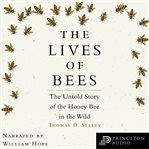Review by Booklist Review
There are numerous titles about endangered species, but few are as effective in getting through to young readers as Williams and her series about what would happen to the ecological chain if one contributing member disappeared. Her current topic is honeybees (previous subjects include sharks, polar bears, and elephants). As with previous offerings, introductory pages offer succinct but informative overviews that describe pollination patterns and hive structure. All too soon, the narrative switches to calamities befalling honeybee populations, such as colony collapse disorder, and the text follows the chain of disruptions: no more bees means less pollination, less pollination means fewer plants, fewer plants means less food for birds, and so on. The illustrations aptly reinforce the book's warnings, using white-dotted outlines to represent items missing from the dinner table (almonds, avocados, and chocolate, among others). The book ends on a hopeful note, citing examples of urban farms and backyard beekeepers. Back matter includes a glossary, ways to help bees survive, and a bibliography. Bee books abound, but most collections should consider adding this one, too.
From Booklist, Copyright (c) American Library Association. Used with permission.
Review by School Library Journal Review
Gr 1--4--This book describes the crucial role honeybees play in our lives and how we can help them survive and remain healthy. The narrative starts in Kent, a county in the United Kingdom that is known as the "Garden of England." The lush illustrations are packed with information about the kinds of bees, the inside of a hive, the process of pollination, and the foods that depend on honeybee pollination. The clear writing is engaging. Many essential vocabulary words and phrases are introduced, such as keystone species, pollinators, superorganism, and Colony Collapse Disorder. Each of these terms is clearly explained. At the beginning of the book, readers learn how honeybees impact life on earth, and then discover the threats to their survival and the ways humans can aid their survival. According to the text, if honeybees disappeared, most of the plants that bees pollinate would also disappear. Additionally, our favorite foods would become rarer, birds might disappear, and there would be a limited variety of crops. This unraveling effect is called a trophic cascade. But all is not lost. The extensive back matter includes a substantial list of ways to save the bees, a glossary, a bibliography, and additional sources. The result is a compelling look at the plight of the honeybee. The illustrations feature a girl with light skin and dark hair and a girl with brown skin and textured hair. VERDICT A rich, well-designed offering with multiple uses for teachers and students. A standout among the many books about honeybees.--Myra Zarnowski, City Univ. of New York
(c) Copyright Library Journals LLC, a wholly owned subsidiary of Media Source, Inc. No redistribution permitted.
Review by Horn Book Review
In this fourth book about a vulnerable keystone species (If Sharks Disappeared and others), Williams envisions the devastating impact of a mass bee extinction. The presentation opens in the verdant hills of Kent, England, where the color-saturated illustrations feature an adult and two kids (one white, one Black) tending a garden. These characters appear throughout as Williams provides a general overview of bee physiology, behavior, reproduction, and hive culture before focusing on currents threats to the species and the projected "unraveling effect" on crops, other species, and more. The friendly illustrations help to deliver Williams's urgent message effectively. More about threats, tips on how to help, a glossary, and a bibliography are appended. (c) Copyright 2023. The Horn Book, Inc., a wholly owned subsidiary of Media Source, Inc. No redistribution permitted.
(c) Copyright The Horn Book, Inc., a wholly owned subsidiary of Media Source, Inc. No redistribution permitted.
Review by Kirkus Book Review
Learn about the importance of keystone species in this buzzworthy book. Honeybees are an important species--but how many people know just how important? Readers will after reading this bee-dazzling book that explains their essential role in the food chain. Three beekeepers (a White adult and two children, one Black and one White) are inspecting their beehives and discover a potential case of colony collapse disorder, a relatively new phenomenon in which an entire colony of bees dies off quickly. The book then delves into the logical events that would follow if all honeybee colonies collapsed, showing how many species--plant and animal, including humans--would be adversely affected. Each double-page spread presents one or two small paragraphs explaining the links in the chain of consequences in moderately simple language. The text is supported by lush cartoon illustrations that will pull in readers with each new page. The book ends with a brief glossary, suggestions for starting honeybee-related conversations at home and with friends, and a full-page bibliography for readers who have been stung with curiosity. It's a fun and engaging read for nonfiction fans and will also pull double duty during science project festivals, as the resources and information will be invaluable for projects on ecology, animal husbandry, or food webs. An added bonus for beekeepers is that all three humans are observing sensible beekeeping practices as they work. (This book was reviewed digitally with 8.5-by-22-inch double-page spreads viewed at actual size.) Sweet as honey. (Informational picture book. 6-10) Copyright (c) Kirkus Reviews, used with permission.
Copyright (c) Kirkus Reviews, used with permission.

